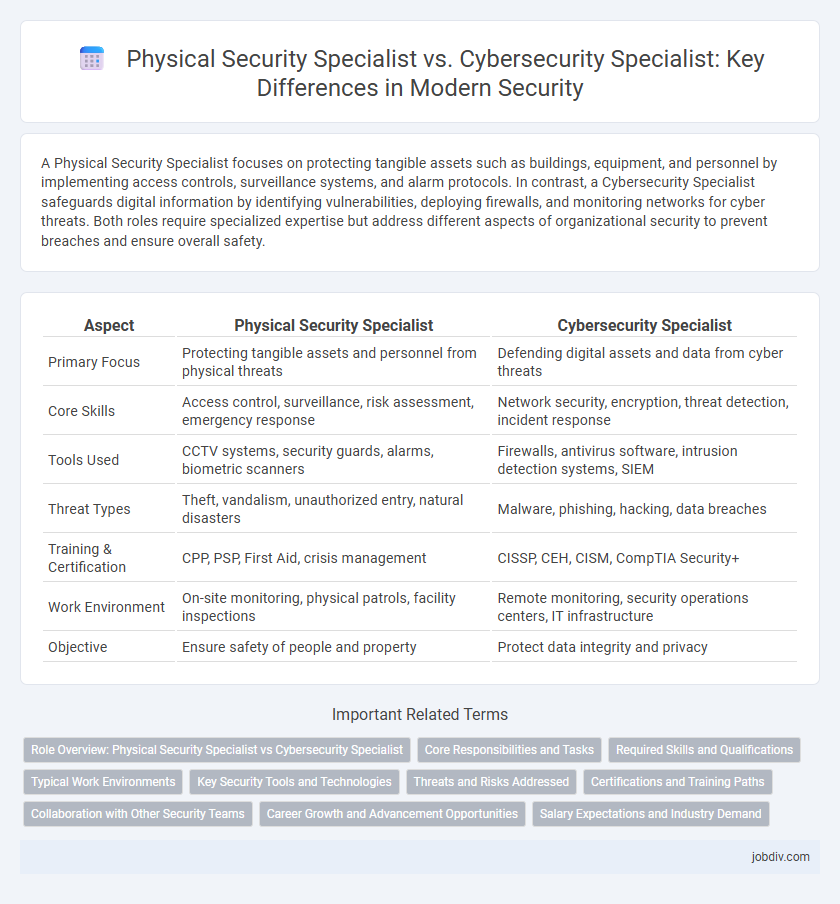A Physical Security Specialist focuses on protecting tangible assets such as buildings, equipment, and personnel by implementing access controls, surveillance systems, and alarm protocols. In contrast, a Cybersecurity Specialist safeguards digital information by identifying vulnerabilities, deploying firewalls, and monitoring networks for cyber threats. Both roles require specialized expertise but address different aspects of organizational security to prevent breaches and ensure overall safety.
Table of Comparison
| Aspect | Physical Security Specialist | Cybersecurity Specialist |
|---|---|---|
| Primary Focus | Protecting tangible assets and personnel from physical threats | Defending digital assets and data from cyber threats |
| Core Skills | Access control, surveillance, risk assessment, emergency response | Network security, encryption, threat detection, incident response |
| Tools Used | CCTV systems, security guards, alarms, biometric scanners | Firewalls, antivirus software, intrusion detection systems, SIEM |
| Threat Types | Theft, vandalism, unauthorized entry, natural disasters | Malware, phishing, hacking, data breaches |
| Training & Certification | CPP, PSP, First Aid, crisis management | CISSP, CEH, CISM, CompTIA Security+ |
| Work Environment | On-site monitoring, physical patrols, facility inspections | Remote monitoring, security operations centers, IT infrastructure |
| Objective | Ensure safety of people and property | Protect data integrity and privacy |
Role Overview: Physical Security Specialist vs Cybersecurity Specialist
Physical Security Specialists design and implement measures to protect personnel, property, and assets from physical threats such as theft, vandalism, and natural disasters, focusing on surveillance systems, access control, and emergency response planning. Cybersecurity Specialists safeguard digital information and IT infrastructure by monitoring networks, managing firewalls, and responding to cyber threats like hacking, malware, and data breaches. Both roles require risk assessment and incident management skills but differ fundamentally in the domains of physical environments versus virtual networks.
Core Responsibilities and Tasks
A Physical Security Specialist is responsible for protecting facilities, personnel, and physical assets through access control systems, surveillance, and risk assessments. In contrast, a Cybersecurity Specialist focuses on safeguarding digital networks, systems, and data by implementing firewalls, encryption, and intrusion detection tools. Both roles require continuous monitoring and incident response, but Physical Security prioritizes tangible environments while Cybersecurity emphasizes virtual threats.
Required Skills and Qualifications
Physical Security Specialists require expertise in risk assessment, surveillance systems, and access control technologies, with strong knowledge of emergency response protocols and regulatory compliance. Cybersecurity Specialists need proficiency in network defense, threat analysis, cryptography, and incident response, alongside certifications such as CISSP, CEH, or CompTIA Security+. Both roles demand analytical thinking, attention to detail, and the ability to implement security policies effectively.
Typical Work Environments
Physical Security Specialists typically operate in environments such as corporate offices, government buildings, and industrial sites where they monitor surveillance systems, control access points, and perform on-site risk assessments. Cybersecurity Specialists usually work within IT departments, data centers, or remote setups, focusing on securing networks, managing firewalls, and responding to cyber threats through digital platforms. Both roles require collaboration with security teams but differ significantly in their operational settings and tools used for safeguarding assets.
Key Security Tools and Technologies
Physical Security Specialists rely on advanced surveillance systems, access control technologies, and intrusion detection sensors to protect facilities and personnel from physical threats. Cybersecurity Specialists employ firewalls, encryption protocols, intrusion prevention systems (IPS), and security information and event management (SIEM) tools to safeguard digital assets and networks. Both roles utilize biometric authentication, but Physical Security focuses on hardware implementation while Cybersecurity emphasizes software-based identity and access management solutions.
Threats and Risks Addressed
Physical Security Specialists focus on mitigating risks related to unauthorized access, theft, vandalism, and environmental hazards impacting physical assets and personnel. Cybersecurity Specialists address threats such as malware, phishing, data breaches, ransomware attacks, and vulnerabilities in software or network infrastructure. Both roles aim to protect organizational resources but differ significantly in the nature of threats, with physical security targeting tangible risks and cybersecurity focusing on digital and information system vulnerabilities.
Certifications and Training Paths
Physical Security Specialists often pursue certifications such as CPP (Certified Protection Professional) and PSP (Physical Security Professional) to validate expertise in risk management, access control, and surveillance systems, while training typically includes courses in security systems design and emergency response. Cybersecurity Specialists focus on certifications like CISSP (Certified Information Systems Security Professional), CEH (Certified Ethical Hacker), and CompTIA Security+ to demonstrate proficiency in network defense, threat detection, and incident response, with training involving hands-on experience in cybersecurity tools and ethical hacking techniques. Both paths require continuous education to stay updated with evolving threats, but Physical Security emphasizes tangible security measures whereas Cybersecurity prioritizes protecting digital infrastructure.
Collaboration with Other Security Teams
Physical Security Specialists collaborate closely with cybersecurity teams to integrate access controls, surveillance systems, and incident response protocols, ensuring comprehensive threat mitigation across both physical and digital environments. Cybersecurity Specialists provide real-time cyber threat intelligence and network security expertise, enhancing physical security measures against potential cyber-physical attacks. Effective communication and coordinated strategies between these specialists reduce vulnerabilities and strengthen overall organizational security posture.
Career Growth and Advancement Opportunities
Physical Security Specialists often advance through roles in risk management and facility security coordination, gaining expertise in surveillance systems and access control technologies. Cybersecurity Specialists experience rapid career growth due to high demand, progressing towards roles such as Security Analyst, Incident Responder, and Chief Information Security Officer (CISO). Both fields offer certifications like CPP for physical security and CISSP for cybersecurity, enhancing advancement prospects and salary potential.
Salary Expectations and Industry Demand
Physical Security Specialists typically earn between $50,000 and $80,000 annually, with demand concentrated in sectors such as government, manufacturing, and critical infrastructure. Cybersecurity Specialists command higher salaries, ranging from $80,000 to $130,000 or more, driven by strong industry demand across finance, technology, and healthcare due to increasing cyber threats. The gap reflects the growing prioritization of digital security, making cybersecurity roles more lucrative and in high demand worldwide.
Physical Security Specialist vs Cybersecurity Specialist Infographic

 jobdiv.com
jobdiv.com